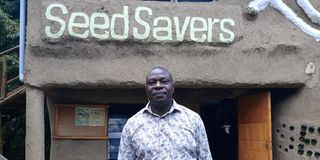Seeds of change: How Nakuru group is making agriculture cool for the youth

Seed Savers Director Daniel Wanjama poses for a photo after an interview with Mtaa Wangu on August 12,2025.
For a long time, agriculture was seen as a preserve of older people, likely to be practising it after retiring from active employment.
This picture was almost always followed by the idea that a farmer is dirty, uneducated and unable to make ends meet.
It is these reasons that understandably, to a certain extent, made agriculture unattractive to young people.
However, the Seed Savers Network aims to change this narrative.
According to the organization’s director Mr Daniel Wanjama one of the reasons young people avoid agriculture is it has continually become less paying.
“Before anything, you have to buy seeds, fertilizer and agrochemicals which the youth find too expensive. And at the end, if rain fed, everyone produces the food at the same time, creating a saturated market,” Mr Wanjama explains.
However, Seed Savers amplifies a model where the farmer does not have to buy all these but instead use saved seeds and farm inputs that are organic and can be made from the comfort of one’s home, without spending any extra coin.
The second selling point to Nakuru youth is value addition.
“We discourage selling raw products because if you add value to them like say drying to extend the shelf life, you can sell them at a higher price and make more money. That will bring youth back to farming,” Mr Wanjama says confidently.
“In terms of market, we provide agro processing centres for youth to use for value addition. If they start and the business grows, they are able to have an income,” Mr Wanjama adds.
Interestingly Wanjama and his team also seek to tackle this issue at its root; in this case, the institutions of higher learning.
“We have analysed the curriculum in these institutions which shows that only 10 percent of it teaches sustainable ways of doing farming. 90 percent is using fertilizers and agro chemicals that poison the soils,” Wanjama laments.
To curb this, the centre offers up to 50 youth attachment annually to learn agroecology. The students are then facilitated to train their communities on seed saving and farming without agrochemicals and fertilizers.
He was speaking during the International youth Day celebration in Gilgil where youth from 22 African countries had gathered ahead of a five-day training on food systems and food sovereignty.


